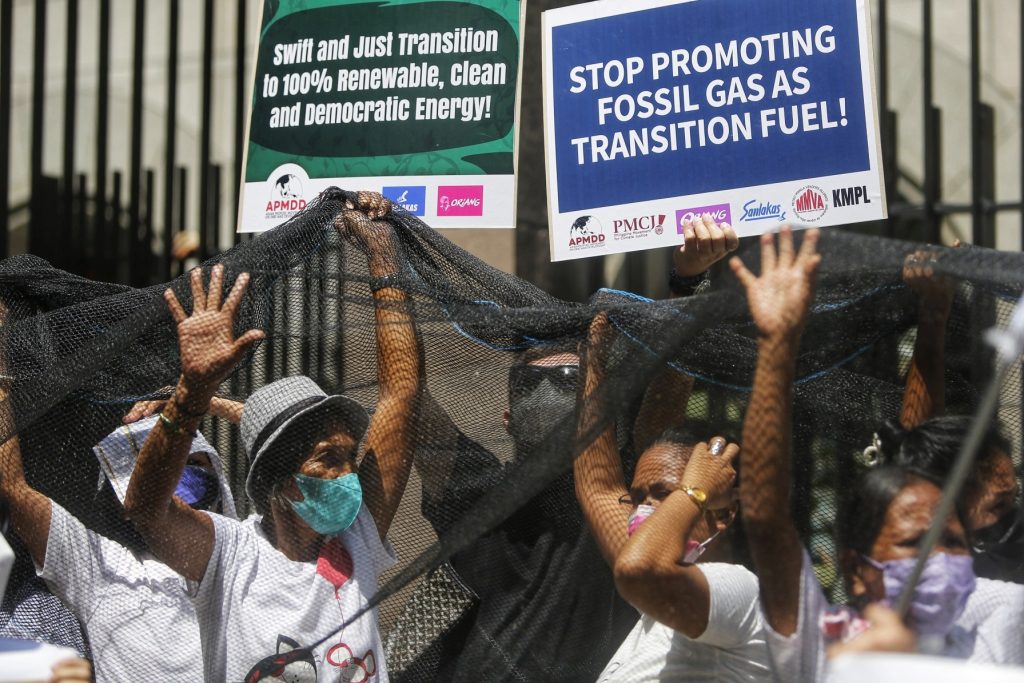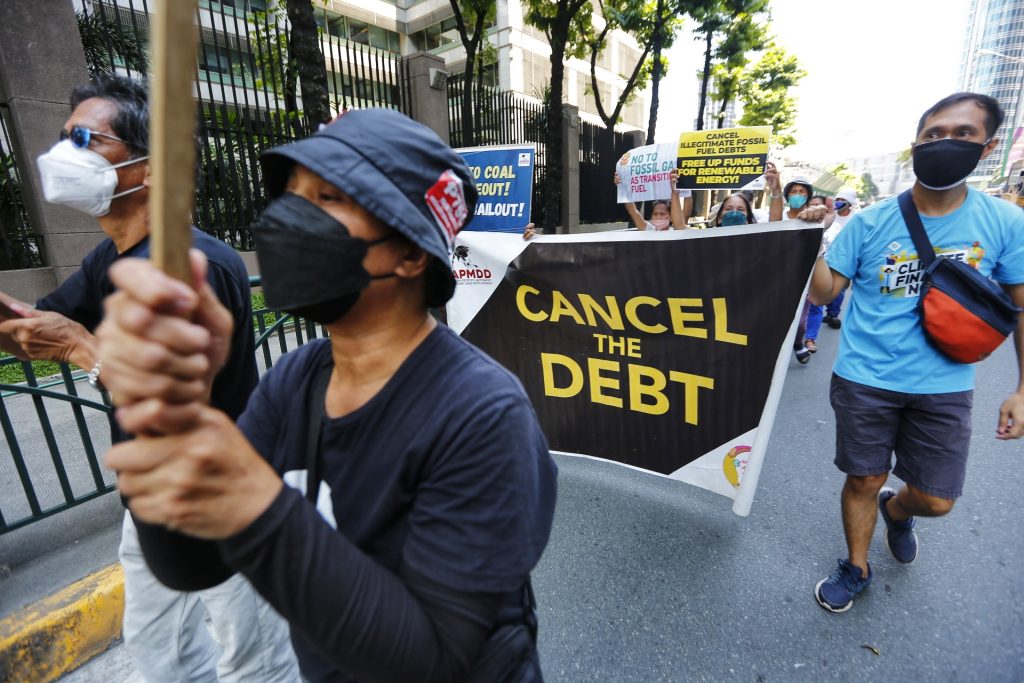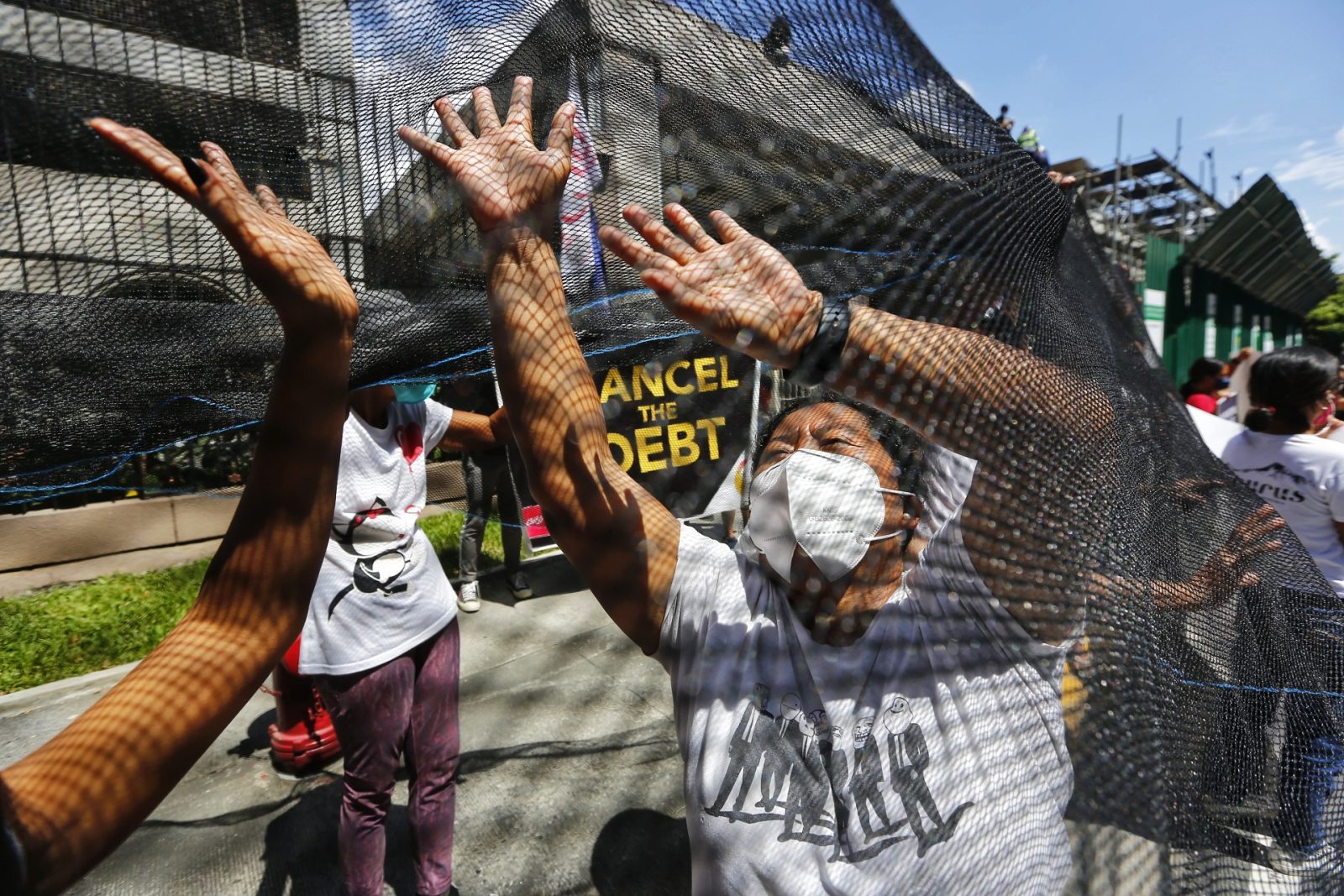Activists called on the Asian Development Bank (ADB) to end all financing for fossil fuel projects and cancel the bank’s sovereign loans that bankrolled such projects.
“It is deplorable that the ADB continues to support fossil fuel projects,” said Lidy Nacpil, coordinator of the Asian Peoples’ Movement on Debt and Development, during a protest rally outside the bank’s headquarters in Manila on May 5.
“We have less than a decade to halve greenhouse gas emissions to avoid a climate catastrophe,” Nacpil said, adding that the bank should “immediately end all forms of support” for all fossil fuel projects, not just coal, and “cancel all fossil fuel debts.”
Climate protesters rallied outside ADB’s headquarters on Thursday as the bank held the first stage of its annual meeting.
The ADB’s new energy policy, which was adopted last year, stopped any support for extraction and power projects in the coal and oil sectors, but allows fossil gas financing. It has spent over US$4.7 billion on gas since the adoption of the Paris Agreement. Its gas finance accounts for over 96 percent of its fossil fuel financing from 2016-2020.
Nacpil said fossil fuel projects have trapped countries into costly fossil-fuel based energy systems and destroyed livelihoods, displaced people and communities, and harmed public health.
Financing of fossil fuel projects has largely been in the form of loans, exacerbating the debt burden of ADB’s developing member countries.
Asia has more than US$350 billion of projects under way to expand liquefied natural gas terminals, gas-burning power plants and pipelines — triple the estimated investment for Europe, according to data from Global Energy Monitor.
Among multilateral development banks, ADB stands out as one of the biggest lenders to the region’s fossil fuel-dominated energy sector.
From 2009 to 2019, it poured in US$42.5 billion into the sector with sovereign loans, grants and technical assistance accounting for three-fourths of the total (US$32.1 billion) and the rest financing non-sovereign (private sector) projects.

“We remind the ADB that its declared commitment to move away from fossil fuels and, specifically, to stop funding new coal power production, does not erase the accountability for the human and environmental toll left in the wake of the projects it has funded,” said Nacpil.
“If anything, the tacit recognition that its fossil fuel projects have and continue to contribute to worsening climate change erodes the legitimacy of the debts that financed the same,” she added.
Ian Rivera, National Coordinator of the Philippine Movement for Climate Justice (PMCJ), said some loan approvals came despite violations of ADB’s own environmental standards and allegedly without thorough studies of renewable energy alternatives.
“Communities still bear adverse impacts of coal projects the ADB funded through loans to the Philippines and other Asian countries,” said Rivera.
“The people, especially the vulnerable and impacted communities, must not be made to suffer the impacts of dirty and harmful projects and continue to pay for them as well,” he added.
India has been ADB’s biggest borrower in the energy sector with loans amounting to US$7.7 billion from 2009-2019. These do not include the US$450 million loan approved in 2008 for the 4,000-MW Tata Mundra Ultra Mega Coal Plant in Gujarat.
The ADB’s own compliance review panel reported the lack of consultation with local communities, and failures in compliance with waste and pollution standards resulting in significant harm to the environment, communities’ health and livelihoods.

ADB’s US$900 million loan in 2013 for the 600-MW Jamshoro coal-fired power plant in Pakistan was supposed to be the bank’s last dirty energy project, but it has remained heavily invested in fossil gas.
In Indonesia, for example, ADB approved in 2016, private sector loans of US$400 million loan for the Tangguh Liquified Natural Gas Expansion project, and in 2018, a US$250 million loan for the Jawa-1 LNG-to-Power Project..
In Bangladesh, the ADB contributed a US$500 million loan to construct the Rupsha 800-Megawatt Combined Cycle Power Plant Project. The project is located near the river-systems of the Sundarban Mangrove Forest, and constantly threatens the livelihoods of around 1,500 fisherfolk communities.
ADB also extended a US$120-million loan to the Korea Electric Power Company-Salcon Power Corporation for the construction and operation of a 200-MW coal-fired power plant in the Philippines. The Visayas Base-Load Power Project holds significant respiratory health risks as well as potential environmental dangers from spills of toxic elements such as arsenic, lead, and mercury.







